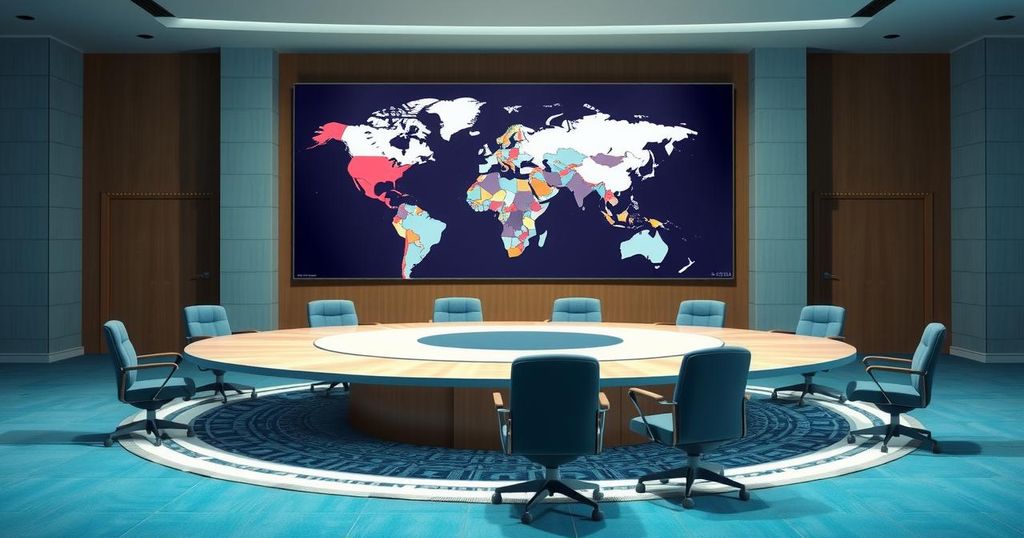Felix Tshisekedi and Paul Kagame met in Qatar for crisis talks on the eastern DRC instability, aimed at addressing the M23 rebellion and establishing a ceasefire. Despite Kigali’s denial of supporting M23, allegations persist from the DRC and UN reports. The dialogue, kept confidential until Tshisekedi’s return, signifies a shift towards the necessity of direct political discourse to resolve conflicts stemming from the region’s volatility.
On Tuesday, Felix Tshisekedi, President of the Democratic Republic of the Congo (DRC), and Paul Kagame, President of Rwanda, convened for crisis negotiations in Qatar, facilitated by the emir. This dialogue sought to address the ongoing security crisis in eastern DRC, where significant areas of South and North Kivu provinces are controlled by the M23 rebellion. These allegations are outlined in multiple United Nations reports, which Kigali disputes.
Various regional organizations and mediators have attempted to revive discussions between the two leaders, culminating in this recent meeting. Sources from RFI’s Africa service state that the talks commenced at 4 PM local time in Doha and lasted about 45 minutes, described as being conducted in a “cordial” atmosphere, largely due to the emir’s involvement. An earlier proposed meeting in January 2023 was canceled unexpectedly.
Tresor Kibangula, from the Ebuteli Institute for Political Analysis, indicated that external pressure and sanctions against Kagame are having an impact, leading Tshisekedi to reconsider negotiations with the M23, a shift from his previous stance following the armed group’s capture of Goma and Bukavu.
Both presidents affirm their support for an immediate ceasefire, coinciding with stalled peace talks in Angola just prior to their discussions. Confidential sources reveal that the details of the talks were kept secret until Tshisekedi returned to Kinshasa. A statement from the leaders reiterates their commitment to an unconditional ceasefire as previously agreed upon at an African summit.
Statements from both administrations confirm a collective desire for “direct political dialogue” with all factions to address the underlying issues driving the conflict in eastern DRC. Kagame expressed hope that cooperative efforts could expedite progress, while Salama’s communication also acknowledged the agreement on an immediate ceasefire and plans for implementation in upcoming days.
Tensions escalated earlier as peace talks in Angola were called off due to the M23’s abrupt withdrawal. The group accused international bodies of undermining peace initiatives, particularly citing sanctions from the European Union that hinder effective dialogue and progression. The M23 criticized Kinshasa’s aggressive rhetoric, claiming it rendered further discussions untenable.
The European Union has sanctioned several Rwandan military officials and the head of Rwanda’s mining agency due to their alleged support of the M23 and associated armed factions. Meanwhile, the M23 asserts that it operates on behalf of Congolese Tutsis and that their military gains have resulted in significant casualties, with DRC reporting over 7,000 fatalities linked to the conflict since January.
Remarkably, a United Nations report has claimed that Rwanda effectively commands the M23 and deploys around 4,000 troops to assert control over resource-rich territories despite endorsing a narrative of facing threats from the FDLR group, linked to the historical 1994 Rwandan genocide. The last significant discussions between the Congolese government and the M23 took place in 2013, highlighting a long-standing impasse in seeking resolutions.
The recent meeting between Felix Tshisekedi and Paul Kagame represents a pivotal moment amid escalating tensions in eastern DRC. Their discussions, facilitated by the emir of Qatar, focused on establishing a ceasefire and fostering direct dialogue to address the instability caused by the M23 rebellion, which has gained substantial territorial control. With external pressures influencing Kagame’s stance, the agreement highlights the urgent need for reconciliation and collaborative efforts to ensure peace in the region.
Original Source: www.rfi.fr




